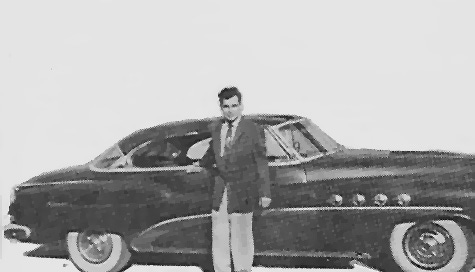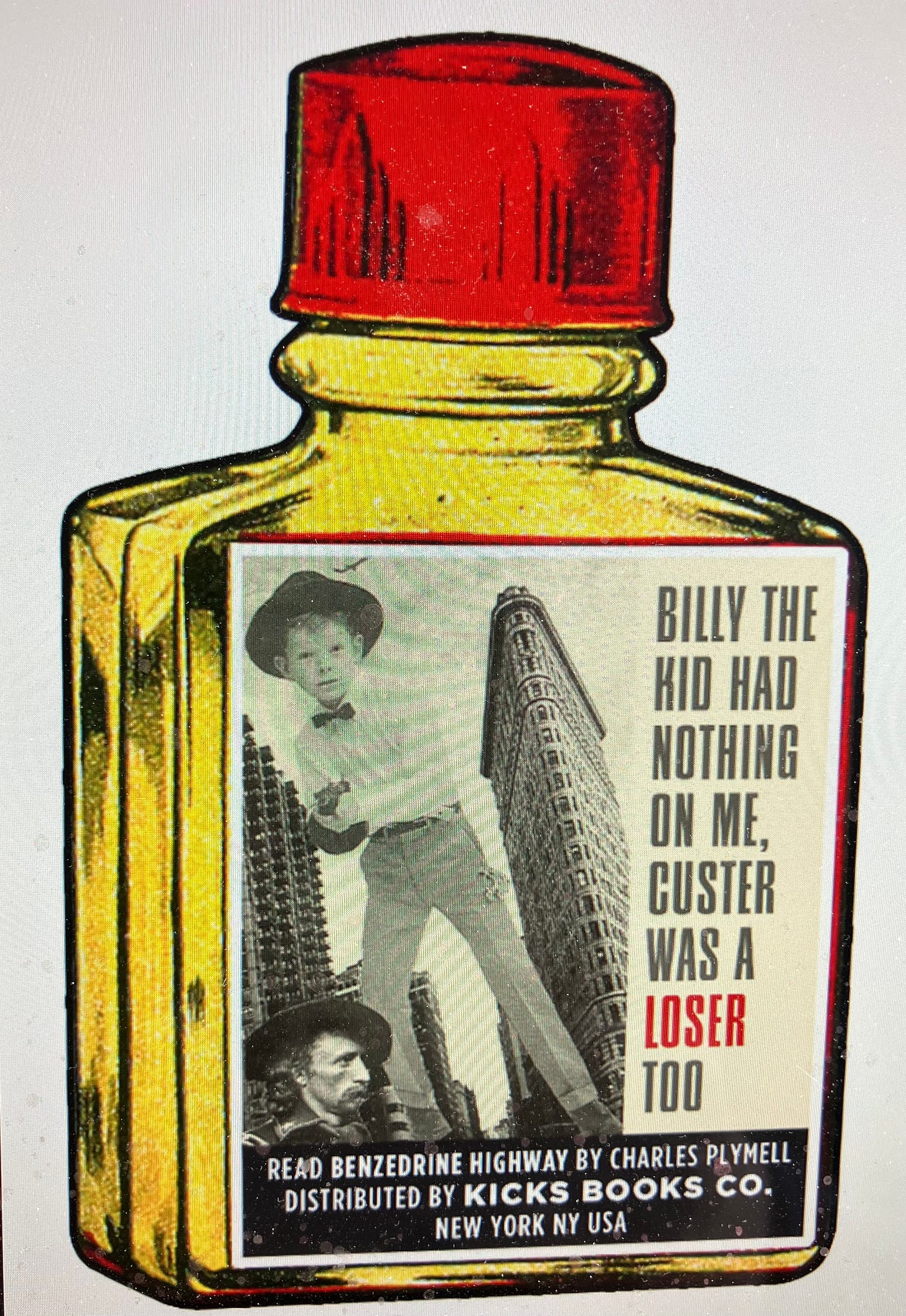LAST MONTH, we carried a glowing review of a recently published poetry collection by legendary Beat figure Charley Plymell. Our correspondent Jonah Raskin, an important voice in the telling of the history of the Beat Generation and the wider counterculture, was deeply thrilled at the work compiled in Over the Stage of Kansas: New and Selected Poems, 1966-2023.
He told readers of Rock and the Beat Generation in his notice, ‘I can say that I like Plymell’s poetry as well as I like anyone else’s poetry right now.’
Raskin further eulogised: ‘I will never forget his poems included in the New and Selected Poems, which belongs on the shelf next to Ginsberg’s Collected Poems and Ezra Pound’s The Cantos. Charles Plymell belongs to Kansas and to the cosmos, to today, yesterday and tomorrow.’
Only days after sharing his positive thoughts about the man’s verse in print, Raskin was able to converse with the writing veteran himself. Here, we share an account of their exchange.
CHARLEY PLYMELL: An interview with JONAH RASKIN
Charley Plymell doesn’t appear as himself or as a fictional character in Allen Ginsberg’s ‘Howl’, Jack Kerouac’s On the Road or John Clellon Holmes’ Go, perhaps the first Beat Generation novel published in 1952. He’s not sorry about his absence from those books.
Still, Charley might have made it into a work of fiction. After all, he’s a genuine, complex character, beloved by friends in and out of academia and as an intrepid traveler, too, who has crisscrossed the USA many times, and has rarely felt at home in any one place. But he has put down deep roots in Cherry Valley, New York. Born in a converted chicken coop in Kansas, he was acknowledged in the 1990s as a distinguished poet by Kansas governor, Joan Finney.
Now 89, and still writing and performing his poetry, he has been married to his wife Pamela (aka Pam) for 57 years, which is more than half his life. Their marriage probably says as much if not more about him than anything else in his bio. Pam has kept Charley on track and helped to provide him with a real home.
Pictured above: A younger Charley Plymell with a 1952 Buick
Charley told me that he doesn't read much. Pam said, ‘He is far more well-read than he lets on. He can recite from memory Shakespeare’s sonnets.’ Sit Charley down, let him get comfortable and he will tell stories, one after the other, going deeper and deeper in the vault of his memory.
He’s one of the great raconteurs of our time. Also, again and again, his work has been timely as well as provocative. Mike Watt turned his poem ‘Planet Chernobyl’ into an opera. Watt and Plymell became ‘compadres’. Plymell heard Watt play with Iggy and the Stooges. He printed Zap Comix and helped to introduce Robert Crumb and S. Clay Wilson to comix book fans in the counterculture.
Jonah Raskin: Charley, where do we begin?
Charley Plymell: Don’t rightly matter. It's all connected. One road leads to another and by the end we’ll probably be back where we started.
JR: How about we begin with you and Cherry Valley, NY…
CP: Suits me. We moved here because Ginsberg was here and we’ve been here ever since. We live in an old stone house that’s cool in summer which is good since summers can be very hot; the bugs which have been asleep or hibernating all winter come out in the heat and bite fiercely. Still, I think we landed in the right spot. There’s a stream and a pond in the back that I like.
JR: You’ve moved around a lot, haven’t you?
CP: I think the only state I have not visited is Mississippi. Born in 1935, I grew up on my parents’ wheat farm in Kansas and learned to drive a wheat truck when I was six. As a boy, I drove most everywhere I could. I was not a momma’s boy. I went to California in 1939 to visit an aunt who had an orange grove. Ever since then, I have often looked at life through a rear view mirror. In 1939, California was a paradise; the air smelled like orange blossoms.
1939 was the best year ever: best cars, best movies, like The Wizard of Oz, which starts and ends in Kansas, and some of the best songs, too, such as Billie Holiday’s “Strange Fruit” recorded in ’39 and banned from radio stations. In 1952 when I was 17 and in Hollywood, I bought a new Buick that was a dream to drive. So not every single good thing belongs to ’39. Other years have also been good.
Pictured above: Promotional graphic for Plymell’s book Benzedrine Highway
JR: Are you a Beat Generation writer?
CP: Great question! I’ve been linked to the Beat Generation. Ferlinghetti published my work at City Lights, and we spent time together. I went with him to a North Beach pool hall, where the jukebox played Caruso and where the old Italians sat around and watched and listened.
Allen Ginsberg moved into my place on Gough Street, so it’s hard to avoid the Beat label. I was on the road already at 16, driving the 1951 Chevy my dad bought me, before there was a Beat Generation. Gas was 15 cents a gallon. There was nothing to hold me back.
JR: What else might you remember about Ginsberg?
CP: On my motorcycle, I took him to visit Kenneth Patchen, the poet and novelist who incorporated jazz in his work. I also took Ginsberg to the Monterey Jazz Festival where he introduced me to Thelonious Monk. Monk didn’t recognize Allen when Allen mentioned Howl. But he remembered him when Allen said, ‘I gave you LSD in New York.’ ‘Oh, yeah,’ Monk said. ‘Got anything stronger?’
I took LSD from Sandoz and once from Owsley if I remember correctly. I didn’t really like to mess around with LSD, so I never joined with Ken Kesey and the Pranksters.
JR: Did you know Kerouac?
CP: Pam and I were in the audience when Kerouac appeared on TV on William Buckley’s Firing Line. Both of them Republicans. After the show, Kerouac was confrontational with me. ‘Who do you think you are?’ he asked. I knew karate and could have bested him in a fight, but I didn’t want to read a headline in a newspaper that would say ‘unknown writer kills famous writer’ So I backed away. Kerouac and I went to a bar, but I don't like bars so I didn’t stay long.
JR: What are some of your favorite and most memorable songs and singers?
CP: Elmore James, the great blues singer, who played the same melody over and over again, like a lot of great musicians. James Carr, who was Memphis-based and who was also the greatest soul singer and who recorded, in ‘67, ‘The Dark End of the Street’; Fats Domino who was an R&B man when I met him; Christine Kittrell, an R&B belter from Memphis, and of course the legendary Jimmie Rodgers, known as ‘the Father of Country Music’, who died soon after he made his last recordings.
I have been known as a songwriter; my poems have been sung. The Canadian Bloodshot Bill set some of my poems to music. One of them, ‘Really Really Neal’, is about Cassady. The recording comes with a 16-page booklet. You can find it on YouTube.
JR: Do you remember any of the other Beat luminaries?
CP: When Herbert Huncke came to Frisco I found him an apartment. Huncke had a real cool voice, the coolest of anyone. He got busy doing smack. I took him to a clinic in Mendocino for treatment. On the way we stopped for food. Huncke ordered pancakes, added syrup and went on the nod. His whole face fell into the pancakes.
I met Burroughs in London in 1968 and visited him a lot when he lived in Lawrence, Kansas.
Pictured above: Another Kicks Book graphic for Benzedrine Highway
JR: What about books? Do you have favorites?
CP: I like music and movies more than books. I have trouble with fiction. Celine’s novels have sat on my shelf for ages. I never read On the Road, but Neal Cassady read to me the parts about himself. I liked Kerouac’s Mexico City poems. Ginsberg gave me a copy.
JR: I’ve heard you were once on the verge of writing a whole book about Kansas. That’s understandable since you were born there.
CP: Random House gave me a contract and $3,000 to write about the place. ‘Naw,’ I told myself. Nothing there for hundreds of miles, though I found shark’s teeth from the time when that part of the country was under a sea. That was exciting. I heard ‘the Voice’ when I was in Kansas.
JR: ‘The Voice’? What do you mean?
CP: Yes, ‘the Voice’. It told me to get out of there fast. I related that story to Random House and they thought I was crazy. I used the concept of ‘the Voice’ as the title for my book Tent Shaker Vortex Voice.
JR: Well, the whole country seems to be going crazy now.
CP: It appears to be bound for a crack-up and on the verge of a civil war. On TV last night I heard some of the Trumpers come right out and say they were gonna go after folks they didn’t like. Right on Rachel Maddow’s MSNBC show. The whole nation is crazy.
JR: Do you have a bucket list, Charley?
CP: Definitely not.
JR: What about drugs? You’re known for using them. Your book Benzedrine Highway was published by Norton Records/Kicks Books.
CP: I’ve tried a lot of drugs: Peyote, Methadone, Percodan, pot and I shot up once and didn't like it.
JR: You’ve learned by doing, haven’t you?
CP: Yes, by working with my hands on farms, on aircraft, and with cars, but I never learned to play a musical instrument, though I owned a slide guitar. But you never know. I might still learn.
JR: Do you have heroes?
CP: No. But I might have anti-heroes.
JR: Are you a grumpy old man?
CP: That’s what Ginsberg called me. But I have also loved life, and roamed widely to satisfy my curiosity about all manner and make of things and people. I hope that I will be remembered as someone who belonged to the old old canon that preceded the Beats, as a writer of songs and as a music lover.
JR: Safe travels, Charley.
See also: ‘Book review #25: Over the Stage of Kansas’, June 18th, 2024






